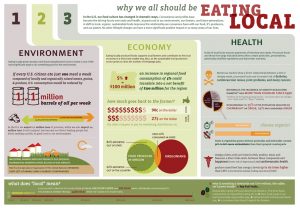Local and large-scale farmers in America are suffering to keep up with big industry prices as a result of large corporations keeping market produce prices extremely low. To aid farmers who do not have the ability to sell at these low prices, there needs to be a change in the way we look at the food we purchase. We as a society need to pay more attention to how our choices about our food affect the food system as a whole. In The Real Cost of Cheap Food we learned that just helping farmers increase production does not aid in their survival and success because “without access to markets, for example, yield increases benefit no one” (Carolan 6). Farmer’s Markets are a step in the right direction because they allow farmers access to customers that would otherwise be unaware of their existence. Large stores like Trader Joes and Whole Foods claim to sell local produce, but they are still purchasing from local corporate farmers instead of smaller, family-owned businesses.
To allow farmers access to markets they can sell their produce in at a larger scale, we need to ensure that grocery stores and online grocery delivery systems like “Amazon Fresh” and “Hello Fresh” are purchasing from the smaller farmers. It may be helpful to encourage local government to create a minimum order for all grocery stores to local farmers to promote the use and steady business with small-scale farmers instead of just large corporate farmers. Support of local smaller-scale farmers creates jobs, saves fossil fuels, and helps to keep the local economy stable and thriving. The local government may have difficulties implementing this program, so it is possible that it is up to the consumer to continue choosing the smaller farm options to encourage large grocery chains to buy from them.


Great post. I agree with you that we should move to more local methods of procuring food, and we should find ways to help local farmers get their products to the market. I don’t if there is actually a solution to this problem though. For example, could a grocery store like say, Whole Foods in downtown Seattle, (man I miss that store, I live in Korea now.) afford to send a truck to all the small farms in the area to pick up their produce? Could those small farms produce enough yield to supply the entirety of Whole Foods with enough produce, lets just say lettuce, to keep their inventory up? Even if there was a system in place that the farmers themselves took the food from their farm to a central location, or delivered their food to Whole Foods, does that not defeat the purpose of buying local? I don’t see a system like that working out very well. Washington State has alot of farm-able land, but how about somewhere like New Jersey or NYC? Where would they get their local produce from? Someone would lose profit. I know I answered with alot of questions, this is a tough problem to tackle, if it was easy someone would have already solved it!